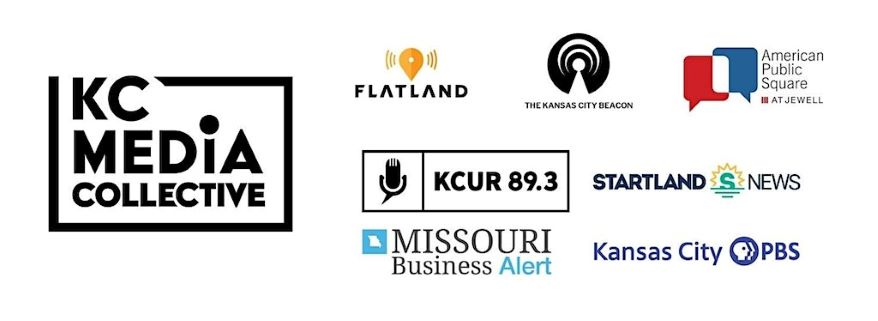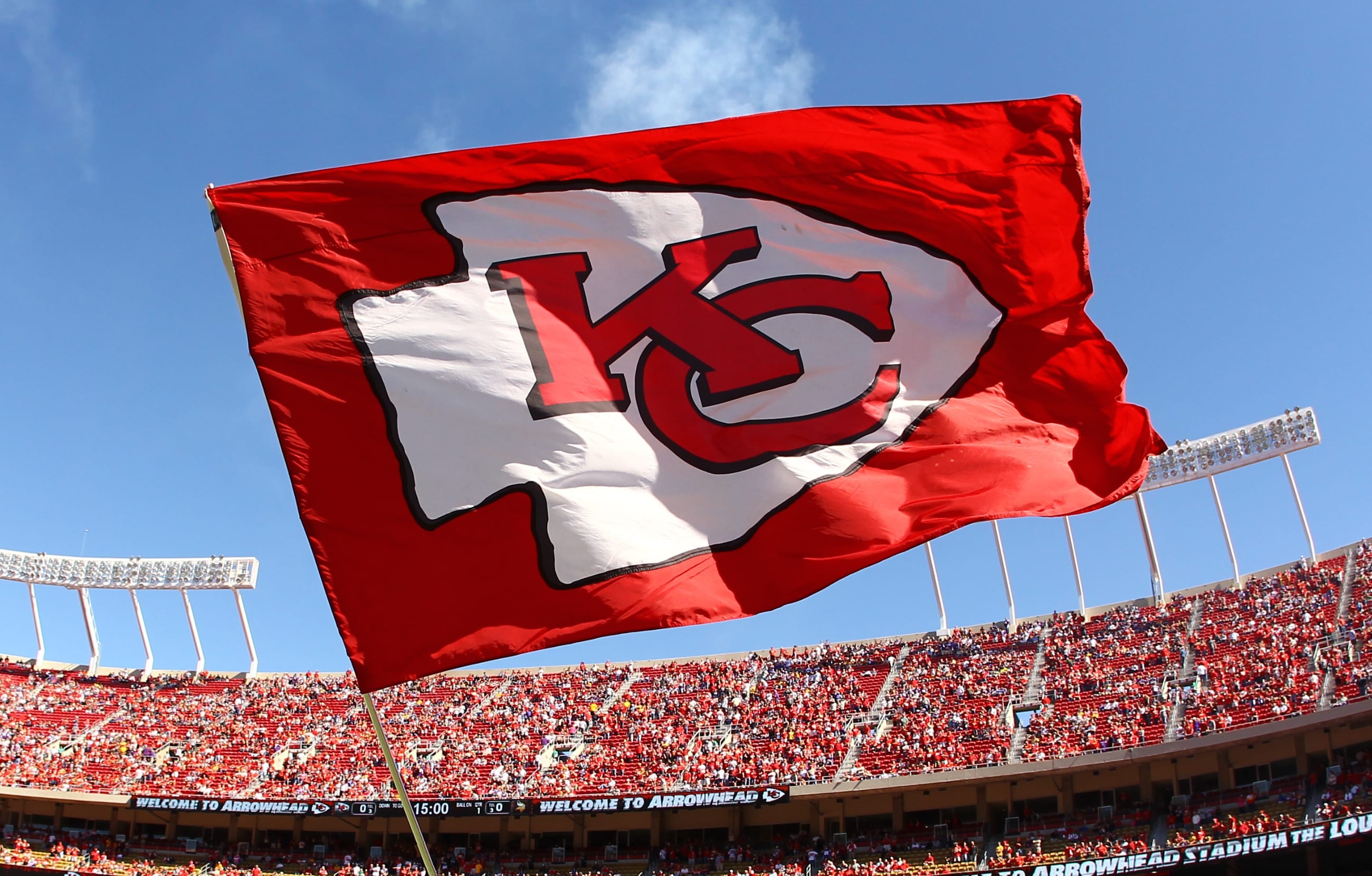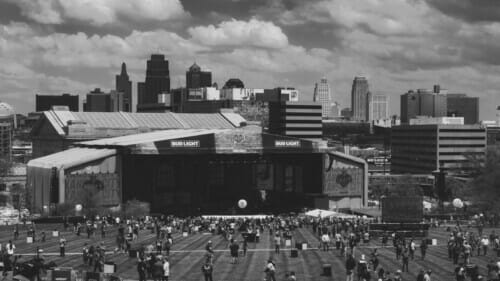Small Businesses Shocked by Low NFL Draft Sales, Now Wary of World Cup 'We Saw People Just Walk Right Past Us'
Published May 4th, 2023 at 6:00 AM
Above image credit: Fans decked out for the NFL Draft walk through the Crossroads Thursday on their way toward Union Station and the NFL Draft event grounds. (Austin Barnes | Startland News)A massive surge in visitors and foot traffic as Kansas City hosted its first NFL Draft failed to score many points outside the event grounds, as countless small businesses along the city’s urban corridor reported a sharp dip in revenue.
“I think we’re all looking at our numbers and everything right now, and we’re just shocked,” said Chelsey M., founder of KC Black Owned, reflecting on poor sales during the three-day event despite more than 300,000 NFL Draft attendees.
KC Black Owned — a directory for more than 200 local Black-owned businesses — experienced a significant drop in its website traffic for the weekend, she shared, although it boosted its online advertising in anticipation of big crowds full of consumers ready to spend.
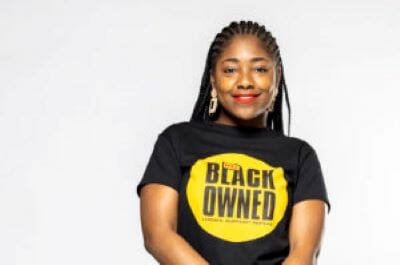
Many businesses with brick-and-mortar storefronts — those affiliated with KC Black Owned and others alike — had stocked up on extra inventory for the projected influx of visitors and are now stuck with it, she added. One member told her they saw a decrease in sales of more than 10%.
“I heard from different businesses — some that were in the Midtown area and some that were in the Crossroads District and off Troost — and they were saying things like, ‘We saw people just walk right past us,’” she said.
NFL Draft weekend — which ran in earnest from Thursday to Saturday — brought sales to a crawl in the Crossroads, agreed Chanel Jezek, co-founder of modern women’s clothing boutique Dear Society within The Bauer on 18th Street.
“It was one of the slowest weeks we’ve had all year, which was definitely a shock,” Jezek said. “We doubled our advertisements on Instagram. We made sure we were fully stocked and staffed, and it was a huge disappointment.”
Kansas City and the NFL previously estimated the event would bring in more than $100 million in direct spending toward the city’s economy. Business owners are now questioning where those dollars were spent. (Officials have not yet released estimates on how much consumers actually shelled out during draft weekend, although businesses featured within the festival grounds around Union Station and the Liberty Memorial reported brisk sales.)
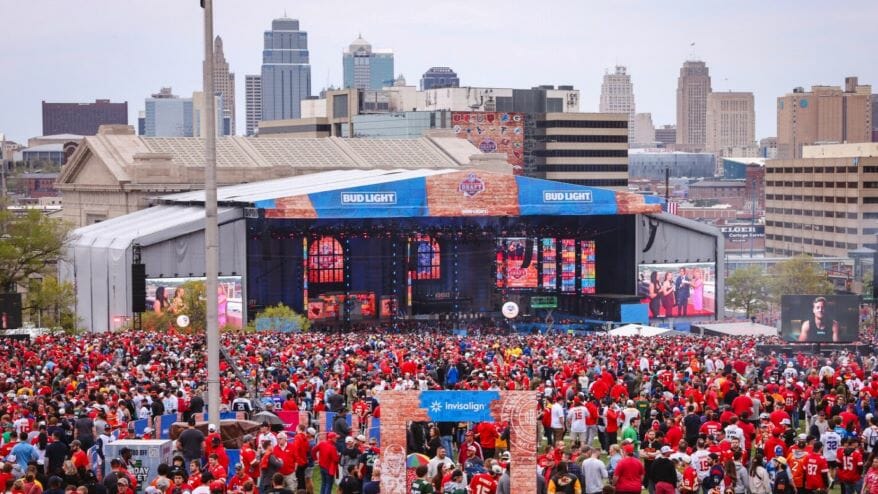
Decreased traffic and attendance for non-draft efforts extended to events, like the free Red Zone concert and maker fair hosted Friday evening at The City Market.
Although City Market promoted Red Zone as much as any event since 2017, according to Sue Patterson, director of marketing and communications, attendance numbers were disappointing.
“It just feels like something like the NFL Draft is so specialized, and it’s so super self-contained with food and shopping and entertainment, that once you go through the gate, you’re not leaving anytime soon,” Patterson said.
“I think that’s what happened,” Patterson continued. “People stayed at the event, and then when they left, they were ready to go home.”
Locals Stayed Home
Tourists failing to stop long enough to shop is disappointing but not entirely surprising, said Brian Roberts, founder of The Black Pantry.
“What was promoted (to attendees) was the draft; people came for the draft,” he said. “It wasn’t promoted as an opportunity for small businesses.”
“Even being a couple blocks away from everything at Union Station, we were dead,” added Roberts, whose shop sits within Made in KC’s Midtown store. “There were cars everywhere up and down Martini Corner, but people were either walking to the draft or at the bars and restaurants. Typically the sports crowd, they want to come and drink; they’re not coming to buy from local businesses.”
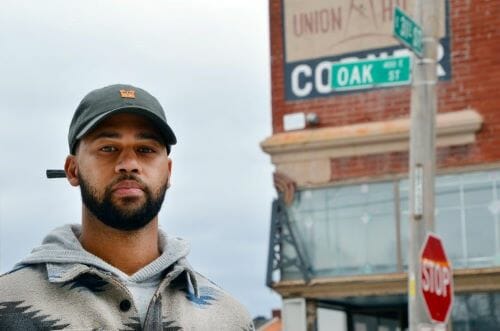
The common conclusion reached by small business owners was that local residents who didn’t attend the Draft simply stayed home to avoid the crowds.
“I live in the River Market and drive to our shop in the Crossroads, and I was expecting crazy traffic,” Jezek said. “It really wasn’t that. I think what happened was that people were scared to come downtown and our (regular) customer base stayed away.”
Patterson pointed to local media coverage of potential traffic and parking woes — which she said were overblown — as a contributing factor that may have dissuaded some Kansas Citians from venturing out over the weekend.
“All the news coverage of parking — or the worries about a lack thereof — or high event pricing, traffic congestion, road closures, construction … seemed to overshadow and deter attendance to all the other ancillary events that were going around all over Kansas City,” Patterson said. “I personally heard people say, ‘I’m not going near Kansas City during the weekend,’ which I think is a shame.”
Chelsey M. concurred, saying that media coverage “sent the wrong message.” (KCMO Mayor Quinton Lucas joined in that criticism of local media via his Instagram.)
The City Market did see plenty of folks park and walk or ride the streetcar to the draft, Patterson said, adding that the streetcar experienced record-breaking ridership over the weekend.
Though the NFL Draft might have kept more local residents at home than usual, Patterson guessed that trend could reverse this coming weekend.
“Here’s my theory: I think Kansas Citians stayed home last weekend, so they’re going to want to get out this weekend,” Patterson said. “As long as we have good weather, we’re in good shape. I really want to see how everybody responds now that the coast is clear.”
Cleanup Before the World Cup
As some business owners chalked up the slow weekend to event-specific factors, others argued that fundamental planning shortcomings at the city level were at least partly to blame.
Crissy Dastrup, founder of Troost Market Collective, said Kansas City, Missouri, leadership must change its structural approach to benefit small businesses in every corner of the city.
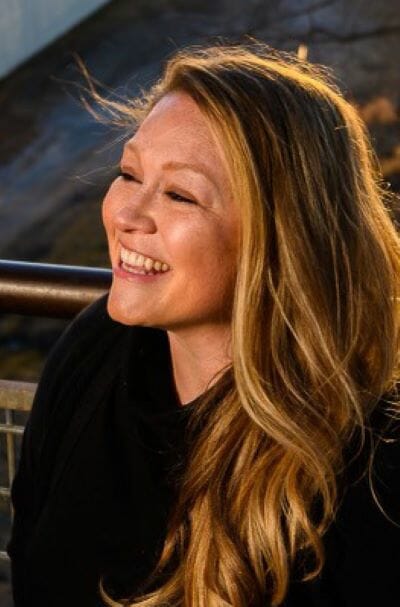
“We need to be using these resources internally to better coordinate support, and really just marketing help in general, for our small business corridors in all of our communities, not just the main ones,” Dastrup said.
In Dastrup’s view, Visit KC — which heavily promoted the NFL Draft alongside lead organizers from the Kansas City Sports Commision — does not equitably reinvest the public tax funding it receives back into all communities, the former District 4 City Council candidate said.
“When we’re talking about our tax dollars — and a lot of the tax dollars are generated from small businesses — how are these dollars finding their way back into communities and small business corridors that are really hyperlocal?” Dastrup wondered. “How are we creating an engine that is producing [for all], rather than one that only produces for a few but gets paid for by the many?”
Elliott Scott, spokesman for the Kansas City Sports Commission, told the Kansas City Star that many businesses “did very well,” emphasizing food vendors inside the draft grounds and businesses that were awarded contracts for the event.
“Our focus, as the local organizing committee, was on the event itself,” Scott told The Star. “We are not in a position to assess a business’s performance. There are many variables including location, product and whether they marketed in advance or during the draft.”
Answering questions about the city’s and organizers’ focus, Dastrup said, will be especially critical in advance of the World Cup, the largest sporting event in the world which will host several games at Arrowhead Stadium during summer 2026.
“I’ve been very openly concerned about getting it right for the World Cup,” Dastrup said. “I think that we have a lot of work to do to get ourselves there — and not cleanup work. We have processes and systems and structures that need to be looked at to make sure that we are being accountable to the people that keep our city operating, who are the taxpayers.”
Specifically, Dastrup suggested that city leaders should work with minority-owned, internationally influenced businesses along Independence Avenue to help them be prepared for international travelers to descend on Kansas City for the World Cup.
“Our international business corridor absolutely is Independence Avenue,” she said. “Most cities have an international corridor; this is ours. We can’t demand that all these businesses get tent-ready to go into a gated area to service a demographic. We need to be bringing that buying power into our communities, and we need to be investing in them and making sure that they’re prepared for it.”
Plan for 2026, But First … Tomorrow
Roberts hopes the city and business owners focus on more immediate concerns.
“The World Cup is going to be cool for the city,” Roberts said. “As someone who was born and raised in Kansas City, it’s dope to see. But I’m not concerned about it business wise. I’m more worried about next week or next month.”
“The World Cup is X number of years away,” Roberts added. “(Business owners) need to be worried about tomorrow, or next week, or the fourth quarter, or Christmas. Again, (the World Cup is) something that the city is promoting. People aren’t coming from France to shop at The Black Pantry. They’re coming to cheer for their team, and if they just so happen to walk by a cool shop, maybe they’ll pop in.”
Patterson expressed optimism that the past is not prologue, noting that no two events are exactly alike.
“I’m hearing a lot of NFL Draft behavior and lessons learned and observations being projected upon what we’re going to experience with the World Cup, and I think that’s a mistake,” Patterson said.
“These two events are very different animals, and I really hope Kansas City doesn’t assume that what happened at the NFL Draft, or whatever it did to business, will mirror what’s going to happen in the future with the World Cup, or any other big event that comes here,” she added.
Chelsey M. agreed that these are important discussions to have as the city prepares for the World Cup.
After brainstorming with another business owner, she said they would like to see a partnership with hotels to feature a directory of small businesses for visitors, or a plan to rotate out the local businesses featured in the event area, so more have the opportunity to benefit.
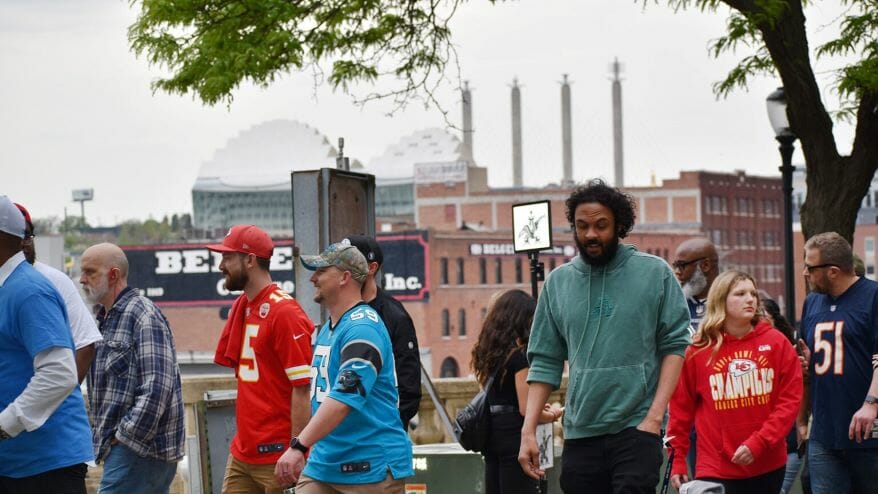
Extra Exposure
While disappointment about low sales might have left a bad taste in the mouths of some local business owners, many agreed that hosting the NFL Draft brought positive attention to Kansas City.
“In terms of the Draft, I think it was really great for Kansas City to get to host that event,” Patterson said. “I think any city that would host an event of that scale is going to experience some growing pains and then some Monday morning quarterbacking, where you look back on it and think, ‘Oh, I could have done this better.’”
She pointed to the EXTRA! EXTRA! newspaper produced by Made in KC as a creative example of how Kansas Citians tend to promote and support each other.
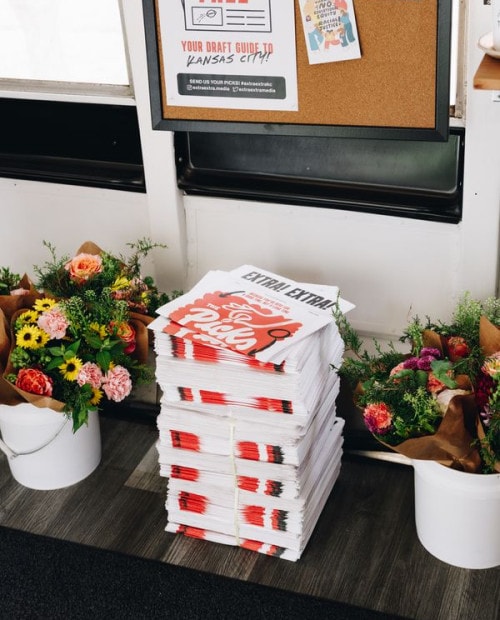
“Kansas City is a really special place in the way we support each other,” Patterson said. “I’ve lived in other cities, and Kansas City is unique in that regard. I think we can be really proud of how everyone rallied to this occasion.”
Tyler Enders, co-owner of Made in KC, said that supporting the small business community was indeed the company’s goal in creating EXTRA! EXTRA!
“Our intent was to steer visitors to the local businesses that make our city special,” Enders said. “Our goal with EXTRA! EXTRA! was to provide NFL Draft fans with an insider, personal recommendation guide to increase the likelihood that the NFL Draft would positively impact local businesses.”
However, Enders admitted that just like many other local businesses, Made in KC stores experienced a surprisingly slow weekend, too.
“We had prepared for one of our busiest weekends of the year and that was not our experience,” Enders said. “While this wasn’t the experience we were expecting or hoping for, we did feel that it was a positive outcome for Kansas City as a whole; hundreds of thousands of people enjoyed experiencing Kansas City, many locals experienced the NFL Draft, and we didn’t have the infrastructure constraints that many people were concerned about.”
Look Hard at Buying Habits
As important as event weekends are to the health of small businesses, community support is what keeps them operating, and more of that consistent patronage is needed, according to business owners.
“One of the best ways our community can support Kansas City businesses is to share the word about the businesses you love,” Jezek said. “A good shout out is free and easy to do. It really does help drive more business into our shop and we really appreciate the love. It’s important if you want your favorite small businesses to stay in Kansas City for a long time.”
Dastrup encouraged Kansas Citians to explore businesses off the beaten path instead of just falling back on habits.
“Invest in your community so that everyone who lives there can thrive,” she said.
Patterson emphasized that shopping small is indeed investing in the Kansas City community, even if consumers may have to pay slightly higher prices and forfeit some convenience.
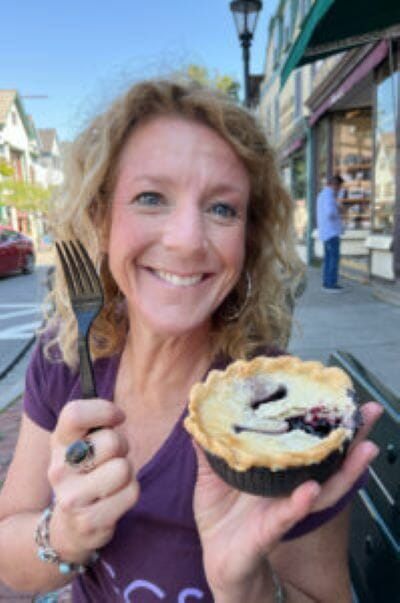
“It’s not like you’re ever sacrificing the thing in terms of quality or aesthetic value when you buy local,” Patterson said. “You’re never sacrificing; you’re only reinvesting into your own people.”
KC Black Owned is working on a modernized version of the classic entertainment coupon book, Chelsey M. said, which would incentivize shopping local all the time.
For $50, the Kick Start KCBO keychain allows community members to get 10, 15, or 20 percent off at participating businesses.
Patterson encouraged all Kansas City residents to examine their own purchasing habits and identify how they can make sure more of their money stays in the community.
“I would love it if every Kansas Citian would really look hard at their buying habits, and find those opportunities where they could actually amend those habits to include more local support,” Patterson said.
“Make a point to support local at least partially,” she added. “If everybody did it a little more than they already do, then it can only help our local businesses, families who own those businesses, and our entire city and community flourish.”
Matthew Gwin is a reporter for Startland News, where this story first appeared. Startland News is a member of the KC Media Collective. Channa Steinmetz, Startland News senior reporter, contributed to this story.
